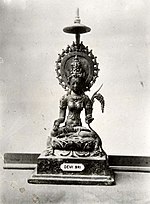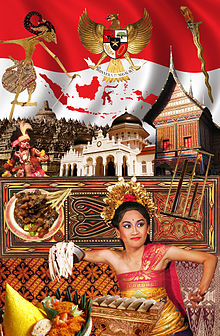Folklore of Indonesia
This article includes a list of general references, but it lacks sufficient corresponding inline citations. (September 2021) |

| This article is a part of the series on |
| Indonesian mythology and folklore |
|---|
 |
|
|
| Part of a series on the |
| Culture of Indonesia |
|---|
 |
| People |
| Languages |
| Mythology and folklore |
| Cuisine |
| Literature |
| Music and performing arts |
| Sport |
Folklore of Indonesia is known in Indonesian as dongeng (lit. 'tale'), cerita rakyat (lit. 'people's story') or folklor (lit. 'folklore'), refer to any folklore found in Indonesia. Its origins are probably an oral culture, with a range of stories of heroes associated with wayang and other forms of theatre, transmitted outside of a written culture. Folklore in Indonesia are closely connected with mythology.
Themes
[edit]Indonesian folklore reflects the diverse culture of Indonesia as well as the diversity of ethnic groups in Indonesia. Many ethnic groups have their own collection of tales and folklores that have been told for generations. The stories are usually told to children as bedtime stories, and have pedagogical values such as kindness, benevolence, modesty, honesty, bravery, patience, persistence, virtue, and morality. For example, one popular theme is "the truth will always prevail, and evil will always be defeated."
While most Indonesian folkloric stories have happy endings and 'happily ever after' themes, some employ tragedy and have sad endings.
Forms
[edit]Most Indonesian folklore started as oral tradition told by storytellers and parents for generations within Indonesian villages. The stories were often sung or chanted in several oral traditions such as pantun, tembang, or children's chants. Some were performed in performing arts such as wayang and sendratari (dance drama). In Malay tradition, some of them are written in scripture as hikayat, while in Javanese tradition, several stories are connected with historical figures and historical records such as babad or older kakawin scriptures such as Pararaton. Indian Hindu-Buddhist epics also influenced Indonesian folklore, especially through wayang and dance drama in Java and Bali. The Hindu epics the Ramayana and Mahabharata have become their own separate versions with Indonesian twists and interpretations that often differ from the Indian versions. The Buddhist Jataka tales also has made its way into Indonesian fables and animal folklores. Jataka stories are found carved as narrative bas-reliefs on ancient Javanese candis, such as the Mendut, Borobudur and Sajiwan temples; telling animal fables about the virtues of Buddha, who performed exceptional acts of kindness in his animal incarnations before being reborn as a Boddhisattva and the future Buddha.
These stories have been collected and used in the Indonesian education system, in small cheap books, usually tied in with a district or region of Indonesia. Many stories explain events or establish moral allegories using iconic or symbolic characters of the past. They also seek to explain the origins of names of people and places from Folk etymology.
During the Suharto era, there were sections of the Indonesian Department of Education and Culture that researched and wrote reports on collected cerita rakyat.
List of Indonesian folklore
[edit]There are several genres of Indonesian folklore.
Tales
[edit]The story of the struggle of a common protagonist to finally achieve happiness despite facing many problems.
- Ande Ande Lumut
- Bawang Putih Bawang Merah
- Jaka Tarub
- Timun Mas
- Roro Mendut
- Putri Tangguk
- Calon Arang
Legends
[edit]The stories that try to explain the origins of certain places, names and/or things.
- Aji Saka
- Banyuwangi
- Dewi Sri
- Lanun
- Legend of the Centipede Lake
- Lutung Kasarung
- Minangkabau
- Malin Kundang
- Parahyangan
- Rara Jonggrang
- Sangkuriang
- Sulanjana
- Watu Gunung
Epic
[edit]Heroic tales of struggles, battles and war. The story of a hero adventure and their exploits.
- Ciung Wanara
- Damarwulan
- Dayang Bandir and Sandean Raja
- Ken Arok and Ken Dedes
- Lutung Kasarung
- Mundinglaya Dikusumah
- Pangeran Katak
- Panji Semirang
- Siliwangi
- Si Pitung
- Gurabesi
Fable
[edit]Animal tales, featuring animals that behave like humans or interact and speak with humans.
Myth
[edit]Witch, demon, spirit or ghost tales, based on urban legends or supernatural phenomena.
By region
[edit]Folklore from Java
[edit]- Kalarahu
- Jaka Tarub and Nawangwulan
- Origin of the Name Banyuwangi
- Origin of the Kelud Mountain
- Origin of the Baturaden
- Bawang Putih and Bawah Merah
- Asal Mula Huruf Jawa/Aji Saka
- Si Wuragil
- Loro Jonggrang and Bandung Bondowoso
- Legend of Suronggotho
- Dewi Sri and Sedana
- Ande-Ande Lumur and Klenting Kuning
- Awan Wedus Gembel
Folklore from Bali
[edit]- Cupak ajak Gerantang
- I Belog Pengangon Bebek
- I Duma
- I Ketimun Mas
- I Lutung Teken I Kakua
- I Pucung
- Siap Selem
- I Sugih ajak I Tiwas
- Naga Besuki
- Ni Bawang Teken Ni Kesuna
- Calon Arang
Folklore from Sumatra
[edit]- Asal Mula Danau Laut Tawar
- Asal Mula Dana Si Losung dan Si Pinggan
- Asal Mula Sungai Ombilin dan Danau Singkar
- Asal Usul Silampari
- Buaya Perompak
- Hang Tuah
- Hikayat Keramat Bujang
- Kera Putih dan Tali Kapal
- Kisah Pohon Enau
- Legenda Batu Gantung
- Legenda Beru Ginting Sope Mbelin
- Legenda Danau Toba
- Legenda Ikan Patin
- Legenda Lau Kawar
- Legenda Mas Merah
- Legenda Namora Pande Bosi
- Legenda Pulau Kapal
- Legenda Putri Bidadari
- Legenda Putri Hijau
- Legenda Putri Nai Mangale
- Legenda Putri Runduk
- Legenda Putri Ular dari Simalungun
- Legenda Sampuraga
- Si Gale-Gale Legend
- Legenda Simardan
- Legenda si Lancang
- Legenda Ular Kepala Tujuh
- Musang Berjanggut
- Pati Enggang dan Rio Brani
- Putri Pandan Berduri
- Dragon Princess
- Raja Pareeket
- Raja yang Culas
- Malin Kundang
- Si Miskin yang Tamak
- Si Pahit Lidah
- Si Sigarlaki dan si Limbat
- Sungai Jodoh
- Ting Gegenting
- Ular n'Daung
- The Legend Of The Origin Of The Silver Catfish
- Kisah Putri Ular
Folklore from Kalimantan
[edit]- Legend of the Centipede Lake (Legenda Danau Lipan)
- The Greedy Fisherman (Asal Muasal Sungai Kawat)
Folklore from Papua
[edit]- Biwar the Dragon Slayer[1]
- Kweiya
- The Story of the Caracal and the Quail
- Watuwe the Mystic Crocodile
- The Origin of Four Kings
Folklore from Sulawesi
[edit]- The Origin of the Mermaid
- Legend of the La Dana and Buffalo
- La Upe and Stepmother
- Pakande the Grandmother
- Putri Tandampalik
- Sawerigading & We Tenriabeng
- Lamadukelleng the Crowned Prince
Folklore from Moluccas
[edit]- Nenek Luhu
- Batu Badaong
- Bulu Pamali
- Suanggi
- Legenda Tanifai
- Buaya Tembaga
- Petualangan Empat Kapiten
- Batu Belah
- Asal Mula Telaga Biru
References
[edit]- ^ "Biwar the Dragon Slayer", Cerita Rakyat Nusantara (in Indonesian), 2011-09-14, retrieved 2022-04-18
Further reading (in English)
[edit]- Moertjipto (1992). Folktales of Yogyakarta South Coast. Translated by Hartiko, Hari. Directorate General of Tourism, Republic of Indonesia.
Further reading (In Indonesian)
[edit]- Danandjaja, James (1992) Cerita Rakyat dar Jawa Tengah Jakarta: Grasindo. ISBN 979-553-038-0
- Setyawan, Dwianto (1992) Cerita Rakyat dari Jawa Timur Jakarta: Grasindo. ISBN 979-553-089-5
- Soemanto, Bakdi (1992) Cerita Rakyat dari Yogyakarta Jakarta: Grasindo. ISBN 979-553-088-7
- Soemanto, Bakdi (1995) Cerita Rakyat dari Yogyakarta 2 Jakarta: Grasindo. ISBN 979-553-683-4
- Soepanto, ed (1976) Ceritera Rakyat Daerah Istimewa Yogyakarta Yogyakarta: Proyek Penelitian dan Pencatatan Kebudayaan Daerah.
